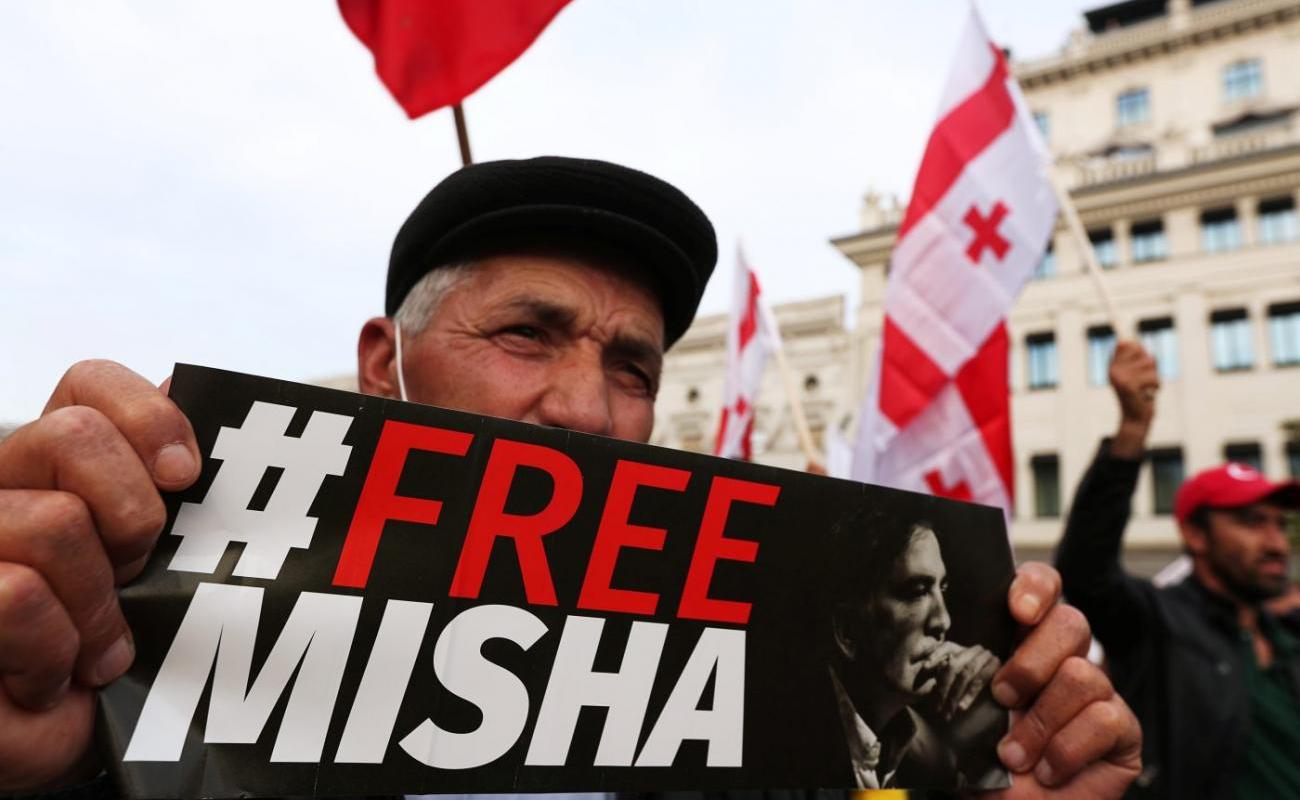Georgia Cracks Down as World’s Attention Drifts

More than three years after his arrest when returning home, former President Mikheil Saakashvili has been sentenced to nine years imprisonment for alleged misappropriation of approximately 9 million lari (around $3.2m) from the state budget in the period 2009-2012.
At the same time, the Georgian Dream ruling party of billionaire Bidzina Ivanishvili, who terms the West the “global party of war,” has been using its controversially acquired parliamentary majority to pass laws designed to further restrict freedoms, including on protest and the right to organize.
The party has long loathed Saakashvili, and there were reasonable questions to be asked of him; international groups criticized his murky ties to kleptocrats during his time in power. But Ivanishvili, a miner’s son now said to be worth more than $7bn, made his money in the wild capitalism of post-1991 Russia and his role as Georgian Dream’s eminence grise has coincided with a fall in the country’s political liberties.
Prosecutors claimed that Saakashvili siphoned off state funds for his own use, including spending on luxury hotels, spa treatments, and cosmetic procedures. Saakashvili had previously been sentenced in absentia in 2018 to six years in prison in separate case involving alleged abuse of power.
Much like opponents of the Russian regime, Saakashvili faces a bleak future. It’s unlikely he will see daylight in 2030 when his term imprisonment ends. The authorities are likely to impose further, longer terms of imprisonment after his two other trials. One relates to 2007, including the dispersal of anti-government protests, a raid on Imedi TV, and the seizure of assets belonging to the late Georgian tycoon Badri Patarkatsishvili. The second involves his alleged illegal border crossing during his 2021 return to Georgia from Ukraine.
Meanwhile, the ruling party continues to roll out new laws strengthening its rule. It has tabled a new legislative initiative titled the “Foreign Agents Registration Act” which is an exact copy of the US Foreign Agents Registration Act (FARA). The draft was reportedly cut and pasted from a US website, using US-specific terms such as “Congress,” “the Library of Congress,” “the State Department,” and “the President of the United States.” The presence of these terms has raised questions about whether the bill was properly adapted to Georgia’s legal and institutional framework, or simply translated verbatim.
The new law will supersede the previous law, the so-called “agents law” which was re-introduced in 2024 (after a failed attempt in 2023) before the parliamentary elections and caused upheaval in the country’s internal politics. That was part of a process that has distanced Georgia from its traditional Western partners while embracing authoritarian Eurasian powers including China.
Officials argue that the Georgian FARA will put an end to what they term false narratives about the intentions of the government. The new legislation will force NGOs and other groups to show how the two acts differ. The government hopes to argue that any criticism of the law will amount to criticism of the US legislation.
Why now? Georgian Dream is making the most of the world’s attention focusing elsewhere. Imprisoning, beating, and pressuring political opponents and demonstrators (recently, some students were expelled from the Shota Rustaveli Theatre and Film University for their support for the ongoing street protests but were later reinstated after a public outcry.)
The US is not only preoccupied with Ukraine, the Middle East, and tariff policy, but its depth of interest in Georgian developments is moot.
The European Union is meanwhile dealing with the profound aftershocks of Washington’s disinterest in (or even hostility to) the continent and must focus on its own defense.
Neither has an appetite to deal with Georgia’s rogue leadership in a relatively far-flung region. Internally too, street protests have somewhat subsided to a few thousand demonstrators in Tbilisi’s center — heavy fines against protesters and other pressure are having an effect.
The opposition is weak, as always, so the ruling party now enjoys relative freedom.
That political elbow room is being used to reshape the country’s future into what is effectively a one-party state resembling the authoritarian (and even dictatorial) models among Georgia’s neighbors.
By writers at the Center for European Policy Analysis (CEPA), and Francis Harris, Managing Editor at Europe’s Edge.
Europe’s Edge is CEPA’s online journal covering critical topics on the foreign policy docket across Europe and North America. All opinions are those of the author and do not necessarily represent the position or views of the institutions they represent or the Center for European Policy Analysis.
